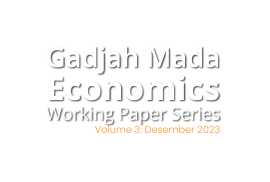Desember
Abstract
This study examines the relationship between climate policy uncertainty and the demand for renewable energy in the United States. The primary findings suggest that there is a nonlinear threshold effect resulting from climate policy uncertainty, as measured by the Climate Policy Uncertainty Index (CPU) and the Environmental Policy Uncertainty Index (ENVPU), on renewable energy demand (REC). The findings indicate a negative relationship between the CPU and the REC when the CPU is beyond a specific threshold. This suggests that economic agents adopt a cautious approach, sometimes referred to as the “wait and see” policy, in their renewable energy allocation. In essence, customers may opt to reduce their utilization of renewable energy in favor of alternate sources as a means to circumvent the investment risks associated with renewable alternatives.
Abstract
This study empirically examines the determinants of financial inclusion among Indonesian Muslims using individual-level panel data. We investigated financial inclusion indicators such as borrowing from financial institutions, bank account ownership, the borrowed amount, and savings in financial services. We analysed data from the Indonesian Family Life Survey (IFLS) fourth (2007) and fifth (2014) waves, offering a comprehensive dataset with unique socio-economic variables. We used Ordinary Least Squares and Logit estimations to identify factors influencing individuals’ access to financial services and the average borrowed amount. Our findings indicate that urban residents with higher wealth, predominantly males, have better access to financial services. Banks remain the primary source for loans among Indonesian Muslims. Access to commercial banks significantly impacts loan accessibility. Notably, Baitul Maal WatTamwil (BMT), an Islamic microfinance institution, enhances the probability of Indonesian Muslims accessing formal loans.
Abstract
This study aims to determine how the implementation of WFH (Work From Home) affects individual work productivity during the COVID-19 pandemic in Indonesia. National Labour Force Survey (Survei Angkatan Kerja Nasional/Sakernas) data for February 2021 were used in this study. In February 2021, the Sakernas questionnaire was added with questions related to the impact of COVID-19 on employment. This study used the instrumental variable analysis method, which accommodates the issue of endogeneity in the model and working in a crowded place (work_crowded) used as the instrument variable. The estimation results obtained through IV regression show that WFH significantly has a positive effect on work productivity. The group of respondents who implemented WFH in their work system, on average, has statistically higher productivity when compared to the group of respondents who did not implement WFH.
Abstract
The share of poor families with female heads of household is steadily increasing, from 14.41% in 2013 to 16.72% in 2019. This is in contrast to the declining poverty rate over the same period. We examine whether families with female heads of household tend to be less prosperous than those with male household heads using the wealth index constructed from the 2019 National Socioeconomic Survey data. In contrast to the hypothesized feminization of poverty theory, we find that households with female heads are more likely to be wealthier than those with male heads, even after controlling for sociodemographic factors of household heads as well as household characteristics. This finding sheds some light on the hypothesized feminization of poverty theory in the context of developing Asian countries.
Abstract
This study aims to estimate the impact of program cessation on the behavior of Program Keluarga Harapan (PKH) beneficiaries. We utilize the Propensity Score Matching (PSM) and Difference-in-Differences (DID) models to overcome potential bias in the estimation results. We use household longitudinal data from the PKH implementation pilot study. The results show that program cessation has a significant positive impact on the share of expenditure on food and the probability of children not attending school, as well as reducing the share of expenditure on education. On the other hand, program cessation has no impact on the utilization of health services, the share of expenditure on health, and the share of expenditure on milk and eggs. These findings indicate that the impact of PKH on behavior related to health tends to continue, while for behavior related to education it does not.


